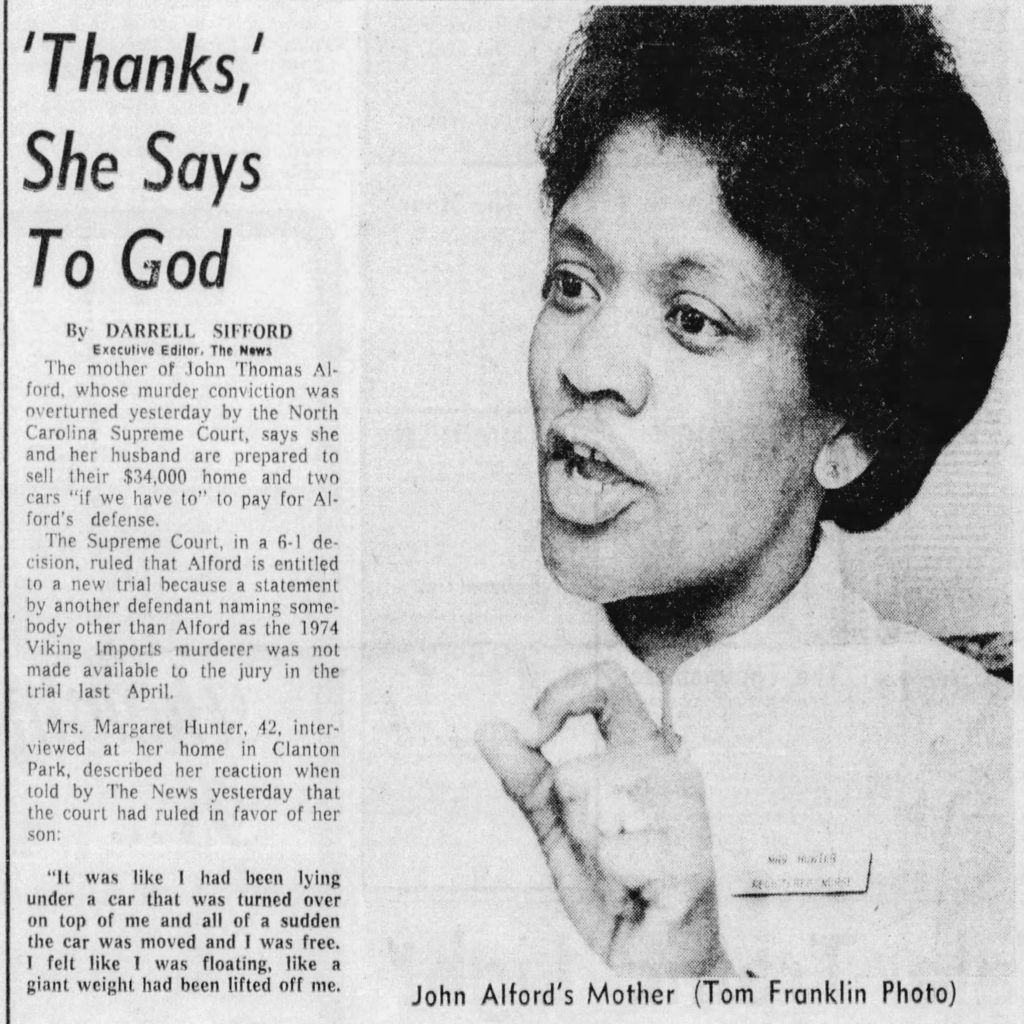This piece by Kristin Collins of the Center for Death Penalty Litigation was published on March 10, 2021 by N.C. Policy Watch.
Last month, two new men were added to the list of innocent people who’ve been sentenced to death in North Carolina.
Anthony Carey was sentenced to execution for a murder he took no part in, based entirely on the testimony of a 16-year-old who had made a deal with the police. The teen said that while he robbed and murdered a gas station attendant, Carey was a passenger in a getaway car parked blocks away. In exchange for that testimony, the prosecutor allowed the teen to plead guilty to second-degree murder while Carey went to death row.
John Thomas Alford was sent to death row for a shooting in an auto parts store, even though four people testified he’d been playing basketball with them at the time of the crime — and even the co-defendant who carried out the murder said Alford wasn’t involved.
The district attorney withheld that last piece of evidence, saying he didn’t want to “confuse the jury” by showing them evidence of Alford’s innocence. Instead, he focused on a suspect lineup where four witnesses picked Alford. However, police polluted the lineup by showing witnesses Alford’s photo beforehand, a tactic that all but assured they would select him.
Both men were tried in Charlotte in the 1970s and had their convictions overturned after spending about a year on death row. Their exonerations had been lost to time until the national Death Penalty Information Center discovered them in the course of researching a new report. Nationwide, DPIC uncovered eleven new death row exonerations, bringing the total to 185 — one for every eight executions that have been carried out in the United States.
With the addition of these cases, North Carolina has sentenced 12 innocent men to death since 1973. They spent a total of 157 years in prison for crimes they didn’t commit.

Both Carey and Alford are Black men who were accused of killing white people — once again bearing out the truth that Black men are more likely to be wrongly convicted , especially in cases with white victims. Of North Carolina’s twelve exonerees, ten are Black, one is Latino, and only one is white. Seven of the cases involved white victims.
Though these exonerations happened close to 50 years ago, many of the systemic flaws they exposed play a role in current death row cases.
For instance, several people on North Carolina’s death row were implicated by unreliable witnesses or co-defendants who were seeking deals in their own cases. Others were convicted with the help of tainted eyewitness identifications, which are a frequent cause of wrongful convictions. And under North Carolina’s felony murder rule, people can still be sentenced to death for killings they did not personally carry out or for which they were not even present.
News stories from the time also noted that Alford had an all-white jury, which discounted the testimony of four Black alibi witnesses. “To hear those four tell it, all they did was play basketball,” one juror told the Charlotte News. “They didn’t work. How could you believe somebody who doesn’t work?”
The exclusion of Black jurors remains a pressing problem across North Carolina. Recently, the N.C. Supreme Court ruled that almost everyone on death row should be allowed to present evidence of systemic discrimination in jury selection under the Racial Justice Act.
These cases are also a reminder that every wrongful conviction is like a bomb going off, affecting not just the person who receives the death sentence but their family and community.
Carey’s brother Albert was sentenced to death alongside him, as the alleged driver of the getaway car, and he was never exonerated. Instead, he was resentenced to life and spent three decades in prison because of a 16-year-old’s allegation.
According to interviews in the Charlotte News, Alford’s mother took a second mortgage on her home to pay for his defense. His stepfather had to work a second job at night to pay it off. And hundreds of community members contributed to his legal defense fund for a second trial. His mother said she asked herself during the ordeal, “Why is this happening to us? Are we being punished? What’s the use of trying to live a good, decent life?”
A system as error-prone as the death penalty breeds distrust that can last for generations and creates harm that can never be healed, no matter how many people we exonerate.
